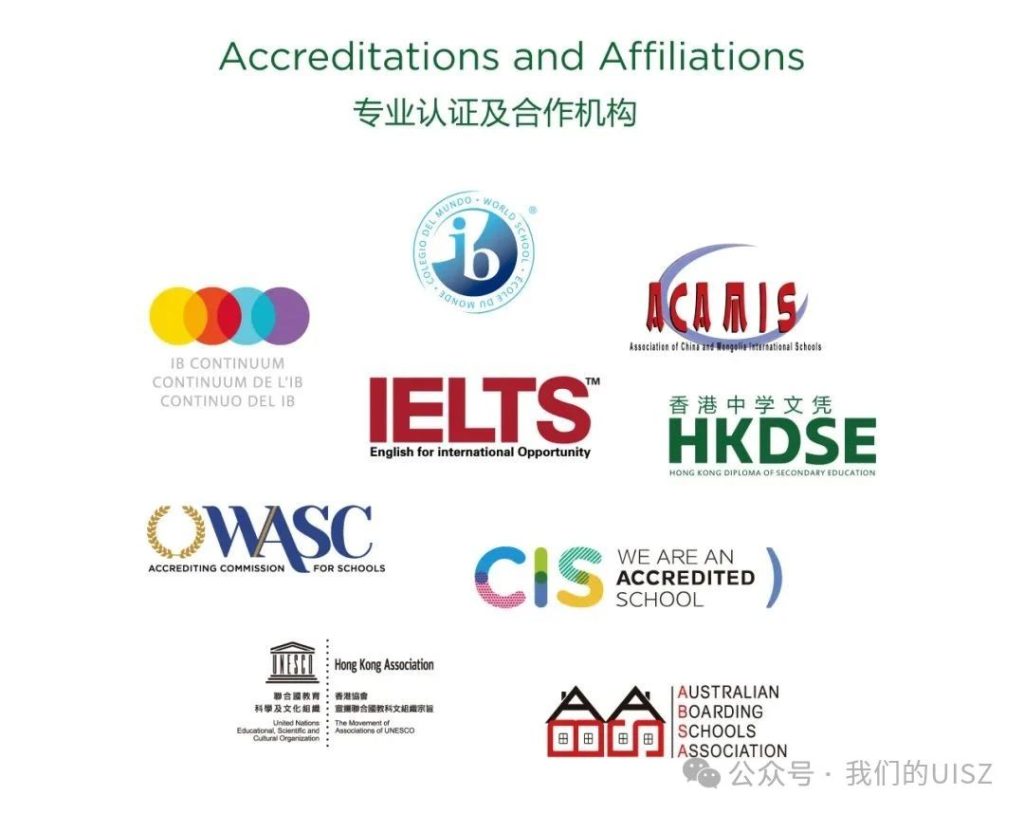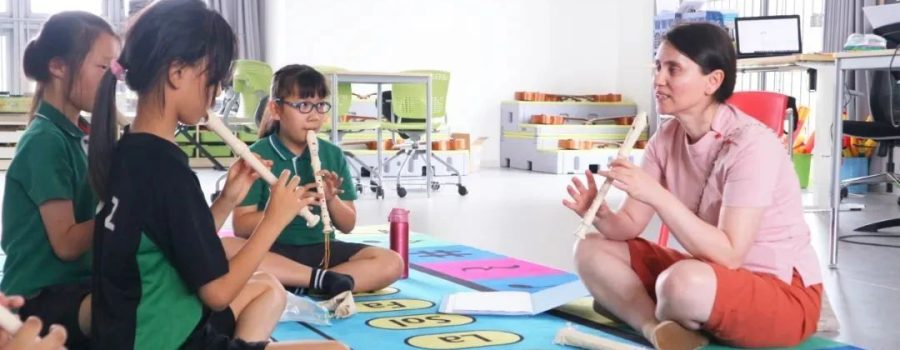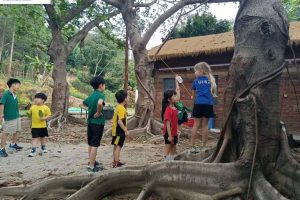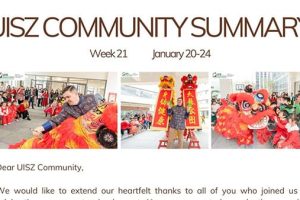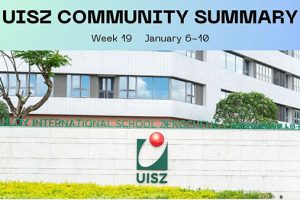INTRO
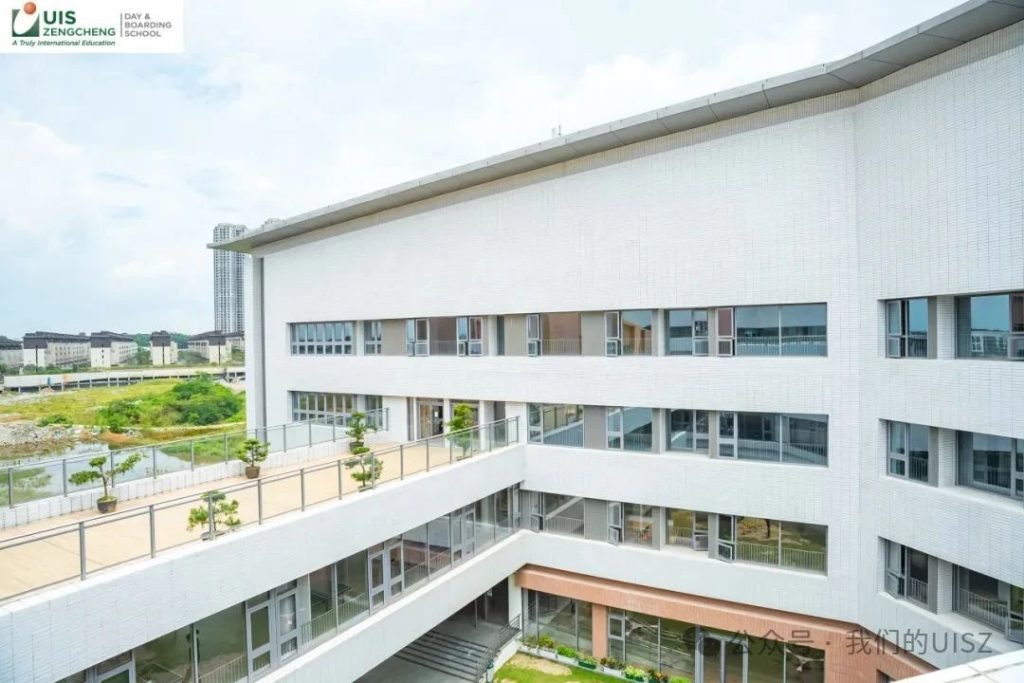
Next week, parents of our new language learners in English will receive reports on how students performed on our WIDA testing. As with many international schools around the world, we have a language rich population, with a high number of new language learners in English. To support our students, we actively assess our language learning students using the WIDA framework. This helps us to better understand how they learn and grow. Since last year, we have collected WIDA data on all language learners and will continue to assess new students twice a year. This ongoing process helps us track each student’s progress and provides valuable insights for teachers to plan lessons and design targeted interventions.
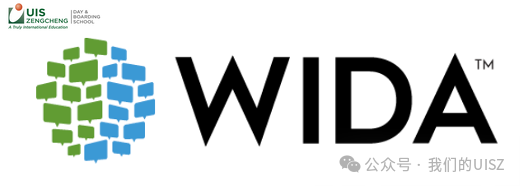
WIDA guides us in recognizing the stages of language development:
· At Stages 1-2 (Entering and Emerging), students build foundational vocabulary and begin using single words or short phrases to communicate.
· At Stages 3-4 (Developing and Expanding), students form more complex sentences and use broader vocabulary to express ideas in familiar settings.
· At Stages 5-6 (Bridging and Reaching), students confidently use academic language and complex sentence structures across subjects and contexts.
Teachers combine WIDA data with classroom observations and other assessments to gain a complete understanding of each student’s abilities. By triangulating this information, educators tailor instruction and interventions to support language growth effectively.
We encourage parents to actively engage in their child’s language journey. Understanding that language development takes time and thrives in a language-rich environment helps families provide the right support at home. Create opportunities for your child to use language daily through conversations, reading, and storytelling.
We also strongly recommend that families continue to develop their child’s home language skills. Research confirms that strengthening a child’s first language supports their English development and overall academic success. Celebrate and nurture both languages to build a strong foundation for learning.
Together, by using data, classroom insights, and family support, we create a powerful partnership that helps every language learner succeed. We look forward to continuing to discuss how students learn and how we can support them.
PYP
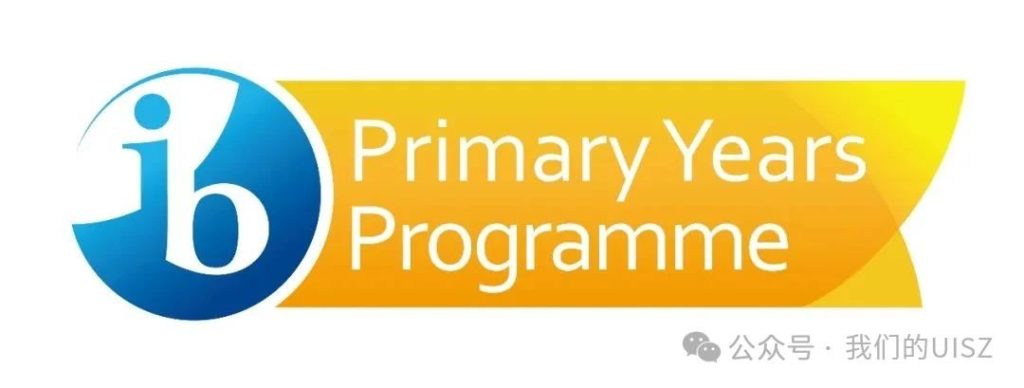
In Early Years Music is experienced in various aspects, like responding to beat, responding to cues, through singing, dancing, working with a partner. This semester students integrated in their singing-stories various percussion instruments successfully to enhance the story telling. Working in different groups and experimenting with different roles strengthened students’ ability to recreate a story with their own unique inputs. Themes like “Who’s That Hatching from the Egg?” and “A Very Hilly Place” had the students inquire in various Science related themes, while singing and moving according to the cues and types of beats, recreating various creatures and living conditions.
For K3&Y1 Music is at a foundational stage where students operate with terminology like Beat, Rhythm, Melodic Contour, Pitches, High&Low. In the process of acquiring understanding and mastery over these concepts, students have a rich experience of singing various songs, decoding some of the aspects through various types of movement activities, including body percussion, they express their aural understanding through a question-and-answer analysis, and they create a unique visual representation of what they heard and understood. This process empowers students to own a concept-base vocabulary and to transfer their understanding in many songs they worked on.
Y2 students are working on a high level with concepts and skills, being able to integrate various little projects in their study time. They worked on an African story-legend “Nyangara Chena”, about a healing snake, with original songs and classroom-based accompaniment. Their solid ground knowledge in Y2 skills and concepts allows students to move freely between various activities, while analyzing classroom repertoire.
Y3 students have been able to secure their musical knowledge and skills ahead of time, allowing them to work on various projects like “Who Has Seen the Wind” and “Little Silver Moon Boat”. Students particularly strengthened their grasp over recorder, xylophones and unpitched percussion. They created original accompaniments using different types of beats and unique rhythms.
Y4 students successfully acquired some of the intermediate music concepts, like syncopation and minor pentatonic. These concepts mark the end of introduction in Music learning and the beginning of advanced rhythm and harmonic concepts. Working individually on small compositions allowed them to freely explore the extents of their knowledge, understanding and creativity. Working in groups with multiple accompaniment types allowed students to be masters of their own part, while contributing to a larger group achievement. They achieved this over many projects, the most important one being the Nigerian song “Funga Alafia”.
Y5 students worked on advanced age-appropriate Music concepts that allowed them to explore the world of harmony. Students worked with concepts like Major/minorthirds, chords and scales. Students know how to discover the components of each chord, how to distinguish between major and minor and how to build any of these chords on the ukulele. Students had fun applying their entire understanding on the ukulele and explore various classroom songs. These songs have been specially selected from various cultures, Irish, Canadian, Chilean etc. around themes related to nature. Students enjoy accompanying themselves while singing.

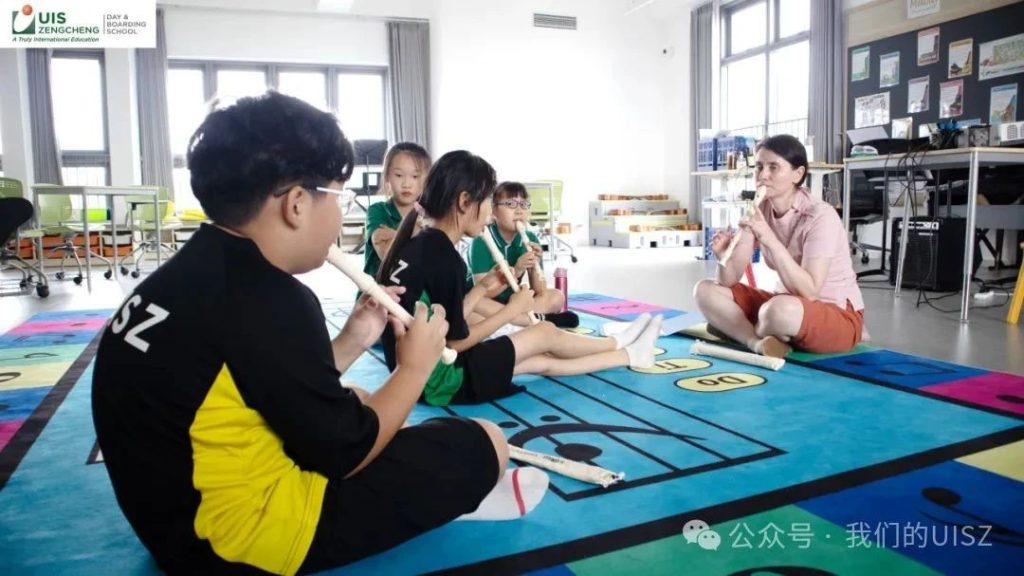
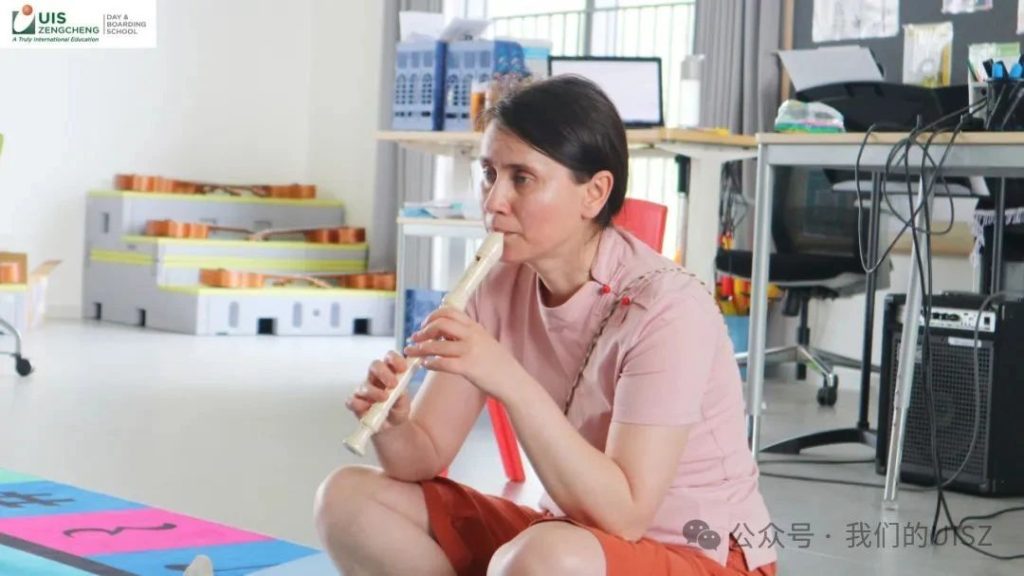
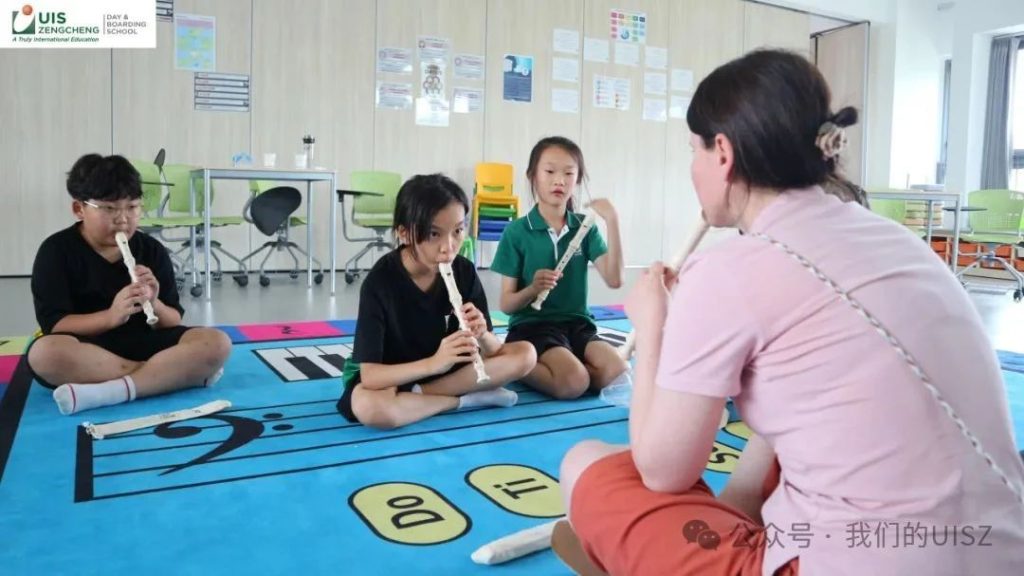
MYP
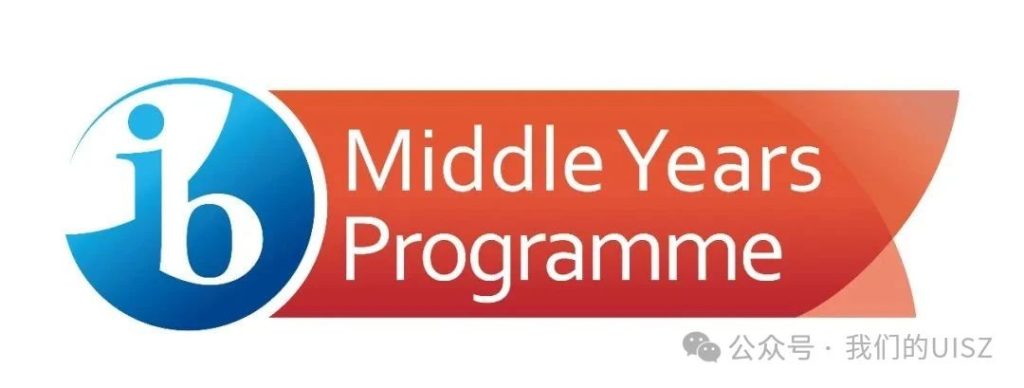
Dear UISZ Community,
I want to take a moment to express my gratitude for your support as we have been busy with various activities at UISZ as we approach the conclusion of another successful academic year.
Firstly, our MYP Year 10 students have successfully completed their e-assessments. Additionally, students participated in our first annual STEAM day, showcasing their creativity and teamwork with students from the PYP. In Chinese class, our Year 9 students presented impressive exhibitions, highlighting their inquiry skills.
In Year 6, students have been analyzing map projections in geography, discussing the reliability of different maps. Meanwhile, Year 7 students have begun their final research project on a chosen kingdom or empire, exploring daily life, social classes, and achievements from the Middle Ages.
As we prepare for summative assessment week, students will be focusing on exams and end-of-year projects. Our teachers are also finalizing curriculum overviews and unit plans for the next academic year, ensuring a smooth transition.
Thank you for your continued partnership in your child’s education.
Best regards,
Scott Gibson
DP
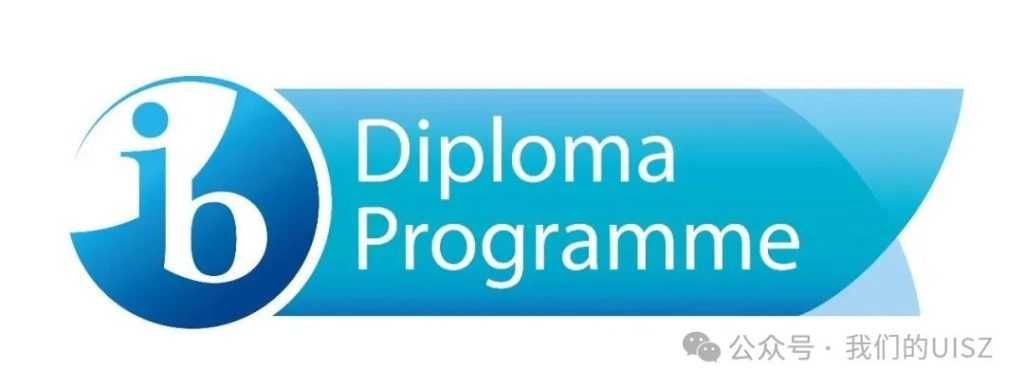
Y10 DP Transition Week Summary
This week, the Y10 DP Transition Week provided valuable insights into the IB Diploma Programme for Y10 students, helping them make informed decisions about their subject choices. During the first two days, DP subject teachers introduced the structure of the courses, the syllabus, the assessment criteria, and the key expectations, allowing students to explore their academic interests.
From Wednesday to Friday, Y10s shadowed DP1 students in real lessons, gaining firsthand experience of the curriculum’s rigor and classroom dynamics. This immersive approach helped them assess their readiness and preferences for different subjects and levels.
At the end, the college counsellor and the DP coordinator met with Y10 students to review their choices and determine the best electives for the moment based on their strengths, interests, and future goals.
Overall, the Transition Week equipped Y10s with a deeper understanding of the DP, ensuring they make well-informed, best-fit decisions for their academic journey.
HKDSE
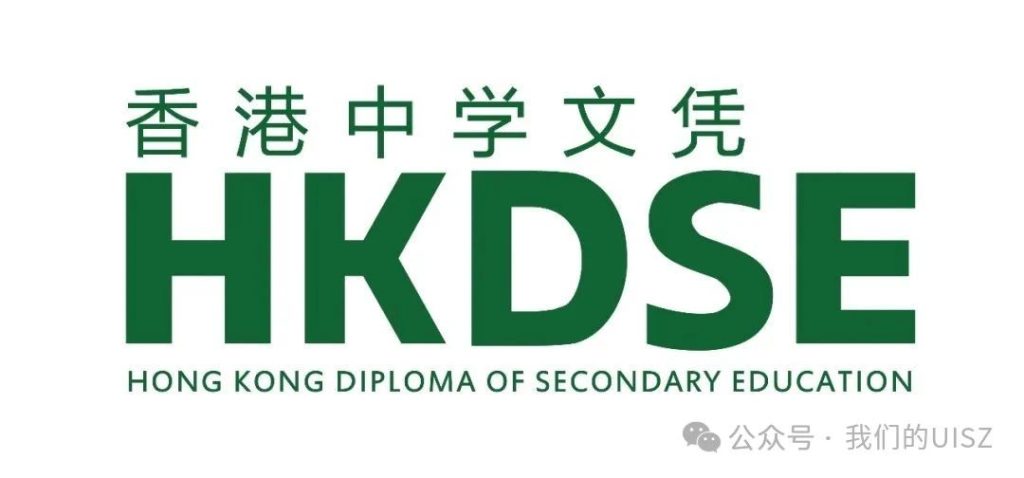
This week, our students have learned about electromagnetic induction in physics class, such as the principles of generators and motors, the importance of the Earth’s magnetic field to living organisms, the principles of electric vehicles, as well as power transmission and energy conservation. With this knowledge, students can better understand and explain common phenomena in daily life, such as why wind and water can generate electricity, how electric vehicles work, and how to use home appliances more efficiently to save energy. Students are very interested in these physics concepts. It is believed that with this knowledge, they will gain a deeper understanding of the nature of phenomena in the natural world. It is also hoped that students will apply more physics knowledge to daily life, thus making our lives better.
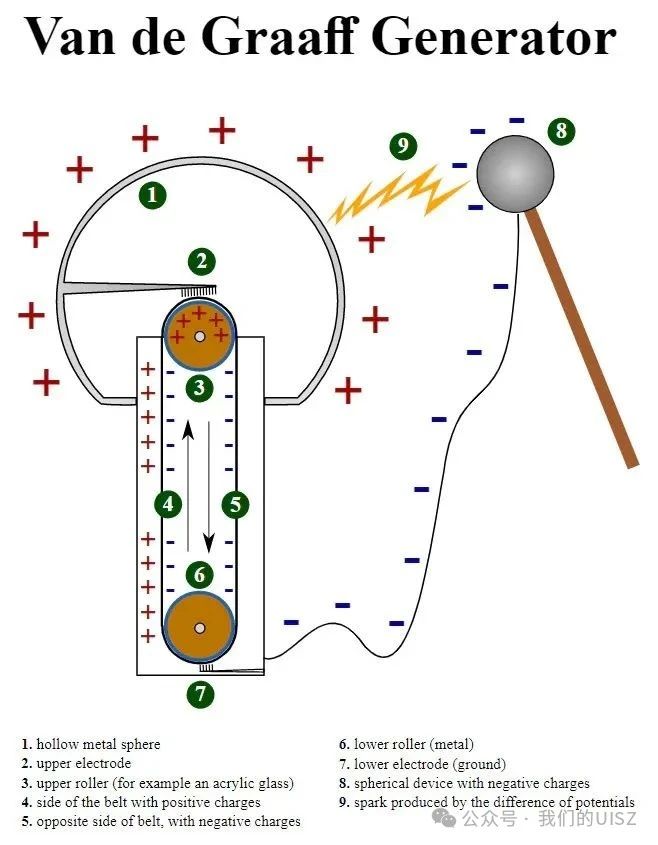
We are wishing an excellent weekend to our students and their families.
Warmest wishes
UISZ School & Boarding Community
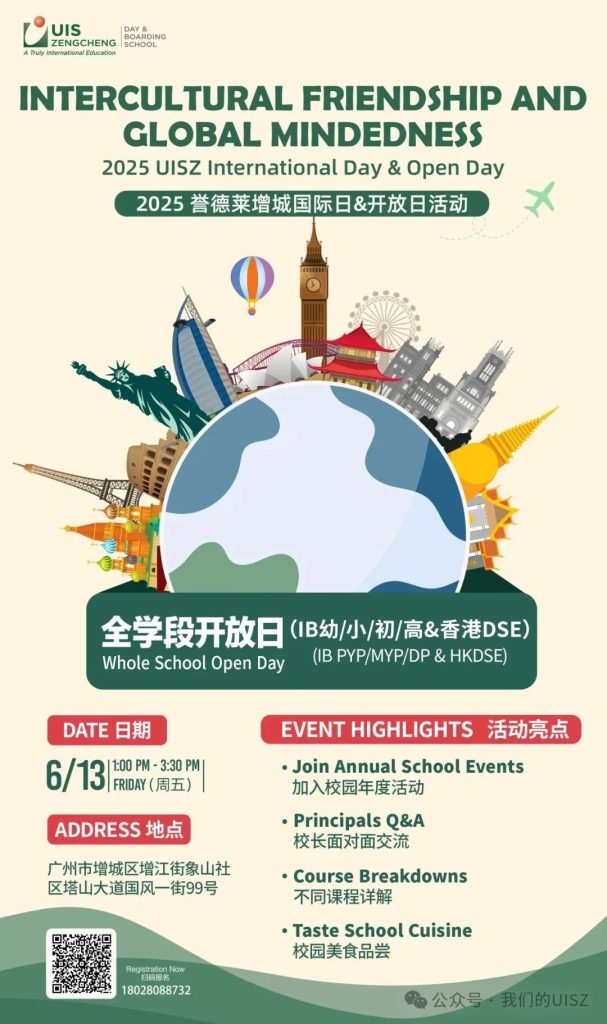
前言

下周,我们英语学习者们的家长将会收到有关孩子 WIDA 测试的报告。和全球多数国际学校一样,我们的语言环境丰富多元,以英语为新语种的学习者人数众多。为了支持同学们,我们积极地运用 WIDA 测试框架对同学们进行评估。这有助于我们更好地了解他们的学习情况和进展。自去年以来,我们一直在收集所有语言学习者们的 WIDA 数据,并将继续每年对新同学进行两次评估。这一持续的过程有助于我们追踪每位同学的进步,并为老师提供有价值的分析,这样可以更有针对性地对他们进行课程规划和设计。

WIDA 帮助我们识别语言发展的各个阶段:
· 在 1 – 2 阶段(入门和初级),学生积累基础词汇,并开始使用单个单词或短语进行交流。
· 在 3 – 4 阶段(发展和拓展),学生能够构建更复杂的句子,并运用更丰富的词汇在熟悉的场景中表达想法。
· 在 5 – 6 阶段(进阶与达成),学生能够自信地在各学科和不同情境中运用学术语言和复杂的句子结构。
老师们将 WIDA 数据与课堂观察及其他评估相结合,以全面了解每位同学的语言能力。通过综合这些信息,老师们能够调整教学和干预措施,从而有效地促进语言发展。
我们鼓励家长们积极参与孩子的语言学习之旅。了解语言发展需要时间,并且在语言丰富的环境中茁壮成长,这有助于家人在家里给予恰当的支持。通过日常对话、阅读和讲故事,为孩子创造更多使用语言的机会。
我们还强烈建议家长们继续培养孩子的母语能力。研究证实,强化孩子的第一语言有助于其英语学习和整体学业成功。要同时认可和培养这两种语言,为孩子的学习打下坚实的基础。
通过综合运用数据、课堂见解以及家庭支持,我们建立起一种强大的合作关系,助力每一位语言学习者取得成功。我们期待着继续探讨学生的学习方式以及我们如何能够为他们提供支持。
国际文凭小学课程

在幼儿教育阶段,音乐的体验是多方面的,如通过唱歌、跳舞、与伙伴合作等方式对节拍做出反应、对提示做出反应。本学期,同学们成功地将各种打击乐器融入到他们的歌唱故事中,为故事的讲述增色不少。
不同小组的合作和不同角色的尝试增强了同学们以自己独特的投入再现故事的能力。在“谁从蛋里孵出来了?”和“非常多山的地方”等主题中,同学们探究了各种与科学相关的主题,并根据提示和节拍类型边唱边动,再现了各种生物和生活状态。
对于幼儿园大班和一年级的学生来说,音乐处于基础阶段,他们需要掌握节拍、节奏、旋律轮廓、音高和音低等术语。在理解和掌握这些概念的过程中,同学们会有丰富的体验,他们会演唱各种歌曲,通过各种类型的动作活动(包括身体打击乐)解码其中的某些方面,他们会通过问答分析来表达自己的听觉理解,他们还会将自己听到和理解的内容制作成独特的视觉表现。
这一过程使同学们能够拥有概念基础词汇,并将他们的理解转移到他们所创作的许多歌曲中。
二年级的同学们在概念和技能方面都达到了很高的水平,能够将各种小项目融入到他们的学习中。他们用原创歌曲和课堂伴奏创作了一部非洲传说“Nyangara Chena”,讲述了一条关于会治病的蛇的故事。
他们扎实的技能和概念基础知识让同学们能够在各种活动之间自由穿梭,同时分析课堂曲目。
三年级的同学已经提前掌握了音乐知识和技能,从而能够开展各种项目,如“谁见过风”和“小银月船”。同学们尤其加强了对竖笛、木琴和无声打击乐的掌握。他们利用不同类型的节拍和独特的节奏创作了原创伴奏。
四年级的同学成功掌握了一些中级音乐概念,如切分音和小五声。这些概念标志着音乐入门学习的结束和高级节奏与和声概念的开始。个人创作的小作品让他们能够自由探索自己的知识、理解力和创造力。
通过多种伴奏类型的小组合作,同学们既能掌握自己的部分,又能为更大的集体成就做出贡献。他们在许多项目中实现了这一目标,其中最重要的是尼日利亚歌曲 “Funga Alafia”。
五年级学生学习了与年龄相适应的高级音乐概念,使他们能够探索和声的世界。学生们学习了大三度/小三度、和弦和音阶等概念。学生们知道如何发现每个和弦的组成部分,如何区分大和弦和小和弦,以及如何在尤克里里上构建这些和弦。学生们将他们的全部理解运用到尤克里里上,并探索了各种课堂歌曲,从中获得了乐趣。这些歌曲都是特别从不同的文化中挑选出来的,如爱尔兰、加拿大、智利等,主题都与自然有关。学生们喜欢边唱边为自己伴奏。




国际文凭中学课程

亲爱的 UISZ 社区家人们:
借此机会,在此向大家表达谢意,感谢大家一直以来的支持。随着又一个学年即将圆满结束,我们目前正紧锣密鼓地筹备着各种活动。
首先,十年级的同学们已经成功完成了他们的电子评估。此外,同学们还参加了我们首届年度活动 —— “STEAM DAY”, 他们和小学部的弟弟妹妹们一起展示了彼此的创造力与团队合作精神。中文课这边,九年级的同学们策划了一场让人印象深刻的展览,展示了他们的探究能力。
六年级的同学们最近在地理单元中分析地图投影,讨论不同地图的可靠性。与此同时,七年级的同学已经开始一项关于自己所选的王国或帝国的最终研究项目,从而探究中世纪的生活常态、社会阶层和成果。
随着我们为总结性评估周做准备,同学们将把精力投入到考试和期末项目中。老师们也在不断完善课程大纲和单元计划,以确保下一学年的过渡顺利进行。
再次感谢大家一直以来在同学们的教育方面给予的支持与合作。
敬上
斯科特·吉布森
国际文凭大学
预科课程

十年级IBDP过渡周总结
本周开展的十年级IBDP过渡周活动为同学们提供了深入了解国际文凭大学预科项目(IBDP)的宝贵机会,帮助他们为学科选择做出明智决策。在活动的前两天,各DP学科教师系统介绍了课程框架、教学大纲、评估标准及核心要求,让学生们能够充分探索自己的学术兴趣。
周三至周五期间,十年级学生跟随DP1年级学长进行了课堂观摩,亲身体验DP课程的学术强度与课堂教学模式。这种沉浸式学习方式将帮助他们有效地评估自身对不同学科及难度等级的适应度与偏好。
最后,大学辅导员和DP课程主任与十年级学生会面,根据他们的优势、兴趣和未来目标,检视自己的选择并确定当下最佳选修课。
本次过渡周通过多维度的体验活动,使十年级学生对IBDP课程体系建立了较为全面的认知,为其制定最优化的学术发展路径奠定了坚实基础。
香港中学文凭课程

在这周的物理课上,同学们探索了“电磁感应”这一主题,例如发电机的原理、电动机的原理、地球磁场对生物的重要性、电动车的原理,以及电力输送和节能等。
掌握了这些知识后,同学们就能更好的理解和解释日常生活中的一些现象,比如为什么风力、水力能发电?比如电动汽车运作的原理、如何更好的运用家电才更节能等等。
同学们对这些物理知识都兴趣高涨,相信凭借这些知识,他们会对自然生活中的一些现象的本质有着更透彻的理解。
也希望同学们能将更多的物理知识运用到日常生活中,从而让我们的生活更美好。

祝愿我们的学生和家人度过一个美好的周末!
致以最温暖的祝愿
增城誉德莱外籍人员子女学校&寄宿社区

들어가며

학부모님께,다음 주에 신규 영어 학습자의 학부모님께서는 학생들의 WIDA 평가 결과 보고서를 수령하시게 됩니다. 전 세계 많은 국제학교와 마찬가지로, 저희 학교는 다양한 언어 배경을 가진 학생들로 구성되어 있으며, 특히 영어를 새롭게 배우는 학습자 비율이 높습니다. 이를 지원하기 위해 저희는 WIDA 프레임워크를 활용해 학생들의 언어 능력을 체계적으로 평가하고 있습니다. 이는 학생들의 학습 및 성장 과정을 이해하는 데 핵심적인 도구입니다. 작년부터 모든 언어 학습자를 대상으로 WIDA 데이터를 수집해 왔으며, 신입생에 대해서는 연 2회 정기 평가를 지속할 예정입니다. 이 지속적인 평가를 통해 개별 학생의 진전을 추적하고, 교사들이 수업을 계획하며 맞춤형 지원 방안을 설계하는 데 중요한 통찰력을 얻고 있습니다.

WIDA 언어 발달 단계 안내
WIDA는 언어 발달 단계를 다음과 같이 구분합니다:
· 1-2단계 (Entering·Emerging) : 기초 어휘를 구축하며, 단어나 짧은 구로 의사소통을 시작하는 단계
· 3-4단계 (Developing·Expanding) : 친숙한 상황에서 복잡한 문장과 폭넓은 어휘로 아이디어를 표현하는 단계
· 5-6단계 (Bridging·Reaching) : 학문적 언어와 복잡한 문장 구조를 다양한 과목과 상황에서 자신 있게 구사하는 단계
교사진은 WIDA 데이터에 교실 관찰 결과 및 기타 평가 자료를 종합하여 각 학생의 능력을 다각적으로 분석합니다. 이 세 가지 정보의 상호 검증(triangulation) 을 통해 맞춤형 수업 전략과 지원 방안을 설계함으로써 언어 발달을 효과적으로 도모합니다.
학부모님께서 자녀의 언어 학습 여정에 적극 참여하시길 권장합니다. 언어 발달이 시간이 걸리며 풍부한 언어 환경에서 활성화된다는 점을 이해하는 것은 가정에서 적절한 지원을 제공하는 데 도움이 됩니다. 대화, 독서, 이야기하기를 통해 자녀가 매일 언어를 사용할 기회를 만들어 주세요.
또한 가정에서 자녀의 모국어 능력을 계속 발전시키길 강력히 권장합니다. 연구에 따르면, 자녀의 첫 언어를 강화하는 것은 영어 발달과 전반적인 학업 성공을 지원합니다. 학습을 위한 튼튼한 기초를 마련하기 위해 두 언어 모두를 축하하고 육성해 주세요.
함께, 데이터, 교실 통찰력, 가정의 지원을 활용하여 우리는 모든 언어 학습자가 성공할 수 있도록 돕는 강력한 협력 관계를 만듭니다. 학생들이 어떻게 배우는지, 그리고 우리가 그들을 어떻게 지원할 수 있는지에 대한 논의를 계속 이어나가길 기대합니다.
초등교육과정

영유아기(Early Years) 에서 음악은 박자에 반응하기, 신호에 맞추기, 노래 부르기, 춤 추기, 파트너와 협업하기 등 다양한 방식으로 경험됩니다. 이번 학기 학생들은 스토리텔링을 강화하기 위해 각종 타악기를 성공적으로 노래-이야기 활동에 통합했습니다. 서로 다른 그룹에서 다양한 역할을 실험하며 작업함으로써, 학생들은 자신만의 독창적인 아이디어로 이야기를 재창조하는 능력을 강화했습니다. “누가 그 알에서 부화할까?” 와 “아주 구릉이 많은 곳” 같은 주제를 통해 과학 관련 테마를 탐구하면서, 신호와 박자 유형에 따라 노래하고 움직이며 다양한 생명체와 서식지를 재현했습니다.
K3 & 1학년(Y1) 음악은 박자(Beat), 리듬(Rhythm), 선율 윤곽(Melodic Contour), 음고(Pitches), 높낮이(High&Low) 같은 용어를 사용하는 기초 단계입니다. 이러한 개념을 이해하고 숙달하는 과정에서 학생들은 다양한 노래를 풍부하게 경험하며, 몸치기(body percussion) 를 포함한 다양한 움직임 활동으로 요소를 해석하고, 질문-응답 분석을 통해 청각적 이해를 표현하며, 들은 내용을 독창적인 시각적 형태로 재현합니다. 이 과정을 통해 학생들은 개념 중심 어휘를 소유하고, 학습한 여러 노래에 이해를 전환할 수 있는 역량을 갖추게 됩니다.
2학년(Y2) 학생들은 개념과 기술을 고수준으로 다루며, 학습 시간에 다양한 소규모 프로젝트를 통합할 수 있습니다. 치유하는 뱀에 관한 아프리카 전설 “냥가라 체나(Nyangara Chena)” 를 오리지널 노래와 교실 반주로 작업했습니다. 2학년 기술과 개념에 대한 탄탄한 기초 지식은 학생들이 교실 레퍼토리를 분석하며 다양한 활동 사이를 자유롭게 이동할 수 있게 합니다.
3학년(Y3) 학생들은 음악 지식과 기술을 조기에 확립하여 “누가 바람을 보았는가(Who Has Seen the Wind)” 와 “작은 은색 달배(Little Silver Moon Boat)” 같은 프로젝트에 집중할 수 있었습니다. 특히 리코더, 실로폰, 무조 타악기(unpitched percussion) 활용 능력이 크게 향상되었으며, 다양한 박자와 독특한 리듬으로 오리지널 반주를 창작했습니다.
4학년(Y4) 학생들은 싱코페이션(syncopation) 과 단5음(minor pentatonic) 같은 중급 음악 개념을 성공적으로 습득했습니다. 이러한 개념은 음악 학습의 입문 단계를 마무리하고 고급 리듬·화성 개념의 시작을 알립니다. 개별 작곡 작업으로 지식·이해·창의성의 범위를 자유롭게 탐색했으며, 다중 반주 유형의 그룹 활동을 통해 자신의 파트를 완벽히 통제하면서 집단 성과에 기여하는 법을 배웠습니다. 특히 나이지리아 노래 “풍가 알라피아(Funga Alafia)” 프로젝트에서 이를 탁월하게 구현했습니다.
5학년(Y5) 학생들은 화성의 세계를 탐구할 수 있는 고급 연령대 음악 개념(장3/단3도, 화음, 음계)으로 작업했습니다. 각 화음의 구성 요소 발견법, 장조/단조 구별법, 우쿨렐레에서 화음 구성법을 익혔습니다. 아일랜드·캐나다·칠레 등 다양한 문화권의 자연 테마 노래를 우쿨렐레로 반주하며 전체 이해력을 적용하는 과정에서 큰 즐거움을 느꼈습니다. 학생들은 노래 부르면서 스스로 반주하는 것을 특히 즐겼습니다.




중등교육과정

UISZ 커뮤니티 여러분께,
또 하나의 성공적인 학년도가 마무리되는 가운데, UISZ에서 다양한 활동으로 분주했던 동안 지지해 주신 데 대해 감사를 표할 기회를 갖고자 합니다.
첫째, MYP 10학년 학생들이 e-어세스먼트(e-assessments) 를 성공적으로 완료했습니다. 또한 학생들은 첫 연례 STEAM 데이에서 PYP 학생들과 협력하며 창의성과 팀워크를 선보였습니다. 중국어 수업에서는 9학년 학생들이 인상적인 전시를 발표하며 그들의 탐구 기술을 부각시켰습니다.
6학년에서는 학생들이 지리 수업에서 지도 투영법(map projections) 을 분석하며 서로 다른 지도의 신뢰성에 대해 논의하고 있습니다. 한편 7학년 학생들은 선택한 왕국 또는 제국에 대한 최종 연구 프로젝트를 시작했으며, 중세 시대의 일상생활, 사회 계급 및 업적을 탐구하고 있습니다.
총괄 평가 주간(summative assessment week)을 준비하며, 학생들은 시험과 연말 프로젝트에 집중할 예정입니다. 교사진은 또한 차기 학년도의 교육과정 개요와 단원 계획을 마무리 중이며, 원활한 전환을 준비하고 있습니다.
자녀 교육에 지속적으로 협력해 주셔서 감사드립니다.
감사합니다.
Scott Gibson
디플로마 과정

Y10 DP 전환 주간요약
이번 주 Y10 DP 전환 주간은 Y10 학생들에게 IB 디플로마 프로그램(DP)에 대한 소중한 통찰력을 제공하여, 그들이 과목 선택에 관한 정보에 기반한 결정을 내릴 수 있도록 지원했습니다. 첫 이틀 동안 DP 과목 교사들은 과정 구조, 강의 계획서, 평가 기준 및 핵심 기대사항을 소개하며 학생들이 학문적 관심사를 탐구할 수 있도록 했습니다.
수요일부터 금요일까지는 Y10 학생들이 DP1 학생들의 실제 수업에 참관하며 교육과정의 엄격성과 교실 역학을 직접 체험했습니다. 이 몰입형 접근 방식은 다양한 과목과 수준에 대한 자신의 준비도와 선호도를 평가하는 데 도움이 되었습니다.
마지막으로 진학 상담 교사 DP 코디네이터가 Y10 학생들과 개별 면담을 진행하여 학생의 강점, 관심사, 미래 목표를 기반으로 현재 시점 최적의 선택 과목을 확정했습니다.
전환 주간은 Y10 학생들이 DP에 대한 깊은 이해를 바탕으로 학문적 여정에 가장 적합한 정보에 기반한 최적의 결정을 내릴 수 있는 기반을 마련했습니다.
홍콩 중등교육과정 프로그램

이번 주 학생들은 물리학 수업에서 발전기와 모터의 원리, 지구 자기장이 생명체에 미치는 영향, 전기 자동차의 원리, 송전과 에너지 절약 등 전자기 유도에 대해 배웠습니다. 이러한 지식을 통해 학생들은 바람과 물이 전기를 생성할 수 있는 이유, 전기 자동차의 작동 원리, 가전제품을 더 효율적으로 사용하여 에너지를 절약하는 방법 등 일상 생활에서 흔히 볼 수 있는 현상을 더 잘 이해하고 설명할 수 있습니다. 학생들은 이러한 물리학 개념에 매우 흥미를 느낍니다. 이러한 지식을 통해 자연계에서 일어나는 현상의 본질을 더 깊이 이해할 수 있을 것으로 믿어집니다. 또한 학생들이 일상 생활에 더 많은 물리 지식을 적용하여 우리의 삶을 더 나아지게 할 수 있기를 바랍니다.

모두 행복한 주말 보내세요.
감사합니다.
유탈로이 정청 국제학교 & 기숙사

